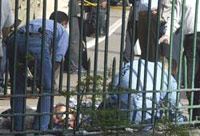
Three people were killed and at least seven others injured on Saturday in two separate attacks targeting tourists in Cairo, raising fears of more Islamic extreme activities in Egypt.
The Saturday attacks, in which a bomber carried out a suicide mission in downtown Cairo and two women shooters fired at a tourist bus in south Cairo, were the second wave of extremist attacks in the capital in less than a month.
On April 7, a suicide bombing killed four people, including 3 foreign tourists, in a Bazaar in downtown Cairo.
The above attacks were also the third wave of extreme activities witnessed in Egypt since last October when a string of bombings rocked Sinai resorts, killing 34 people.
"We're talking about three waves of attacks in just less than seven months," said Saber Rabie, an Arab analyst. "The trend is alarming."
Between 1992-1997, Islamic extremists started an insurgency aimed at overthrowing the government led by President Hosni Mubarak and launched a string of attacks against foreign tourists. They had hoped to weaken the national economy by scaring foreigners away from the country.
Those five years witnessed numerous killings of foreign tourists by the Islamic extremists in Cairo and at spots of tourist attraction across the country. A large number of Egyptians also fell victim to the attacks.
The chain of terror culminated in November 1997 when Islamic militants killed 58 foreign tourists and four Egyptians in an attack at the Pharaonic Temple of Hatshepsut outside Luxor in southern Egypt, shocking both Egypt and the international community.
The notorious attack later became known as the "Massacre in Luxor" and has since served as a rallying call for the Egyptians to strike back against what they call "cowardly criminals."
Late Saturday, an Interior Ministry statement identified the perpetrator of Saturday's bombing as Ehab Yousri Yassin, who setoff the explosives he was carrying and jumped from the Sixth of October Bridge over Abdel Moneim Riyadh square while pursued by police.
The blast took place near a bus station behind the Egyptian Museum which is a famed tourist site.
The man was wanted by police as a suspect in an April 7 bomb attack targeting foreigners near a tourist bazaar in old Cairo which killed four people including three foreigners, the statement added.
Less than two hours of the first blast, the second incident occurred in Cairo's El Sayyeda Aisha area, very close to the famed historic site of Citadel, during which two women attackers were killed in their exchange of fire with police, while they intended to open fire on a tourist bus.
The Interior Ministry identified the two women as Ehab Yousri Yassin's sister and girlfriend, Nagat Yousri Yassin and ImanIbrahim Khamis.
"Nagat Yousri Yassin killed herself and shot her friend ImanIbrahim Khamis in Saida Aisha area, south Cairo," who died of her wounds at hospital later, the ministry said, quoted by the official MENA news agency.
Soon after the two attacks, two Islamist groups claimed responsibility for the incidents in internet statements.
In a statement, the first group calling itself the Brigades of the Martyr Abdullah Azzam said the attacks were in revenge for the deaths of those who carried out bombings last year in Egypt's Sinai Peninsula and for the subsequent arrests of thousands of people.
Another group calling itself the Mujahideen of Egypt also claimed for the responsibility in a website statement.
However, neither statement's authenticity could be verified.
(Xinhua News Agency May 1, 2005)
|

